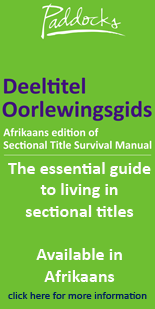By Jennifer Paddock

Q1: Is it enough to send notices via email for annual general meetings and special general meetings or must it be by post even though the owners have email addresses?
A1: In terms of the South African common law all notices of general meetings must be in writing unless the constitution of the body provides otherwise.
 The prescribed management rules provide that notice of the inaugural meeting must be in writing and make it clear that notices of general meetings must be “delivered” and that “documents” must be sent. So notice of general meetings must be in writing unless the rules of the scheme are changed to make it clear that notice can be given otherwise (such as via email).
The prescribed management rules provide that notice of the inaugural meeting must be in writing and make it clear that notices of general meetings must be “delivered” and that “documents” must be sent. So notice of general meetings must be in writing unless the rules of the scheme are changed to make it clear that notice can be given otherwise (such as via email).
If the scheme’s rule were changed so as to allow notice of meetings to be sent via email the rule providing for this would have to have an “opt-in” provision. This provision would allow owners who want to receive notice via email to notify the trustees in writing that they are happy to receive notice in this way, but would also allow those people without access to computers to continue to receive notice by post or by hand. If there was no opt-in provision the owners without access to computers would be unreasonably prejudiced by the amendment to the rules.
Nominations and proxies
Q2: Most of our owners are long distance and in order for a nomination to be confirmed it needs to be signed by the nominee as accepted, is this correct and secondly, does the nominee need to sign the “I am of sound mind etc”. What happens if the nomination is not signed but the person is present at the meeting, can he or she not just confirm acceptance there? Secondly the proxy form, can one stipulate a yes no system on it for voting. In other words I want to avoid one owner holding proxies to have his vote x 5 or ten but rather want each owner even though they cannot be present at the meeting to have his or own say in how voting should go. If there is a deadlock on votes, we then give the owner the option to allow his proxy holder to vote his way or stay as per their proxy form. The voting in this case will be for the utilisation of surplus funds for both need items such as lawn mower and improvement items eg refurbish pool area braais. etc Your comments please. Thanks, Viv
A2: Prescribed management rule 7 provides that:
‘Nominations by owners for the election of trustees at any AGM shall be given in writing, accompanied by the written consent of the person nominated, so as to be received at the domicilium of the body corporate not later than 48 hours before the meeting: Provided that trustees are also capable of being elected by way of nominations with the consent of the nominee given at the meeting itself should insufficient written nominations be received to comply with rule 4(1)’.
The nominees do not need to declare that they are of sound mind etc. A person is presumed to be of sound mind until the contrary is proven and if it turns out that a nominee who becomes a trustee is of unsound mind, s/he will automatically cease to hold office as a trustee in terms of the provisions of PMR 13.
If a trustee nomination is not signed then one of two things could happen at the AGM:
- If there are sufficient signed nomination forms, which were received at least 48 hours before the AGM, to fill the number of positions of trustees decided upon by the meeting, then those persons who were properly nominated will fill the positions of trustees and the nominee whose form was not signed will unfortunately have to try again next year.
- If there are insufficient persons properly nominated prior to the AGM to fill the number of positions of trustees decided upon at the AGM, then the person whose nomination form was not correctly completed can be nominated at the meeting and if s/he consents to the nomination, s/he will stand for election.
No one wants to be a trustee
Q3: I currently manage a complex of 40 units. The problem is, is that not one single owner (except the current Chairman) wants to take on the role of Trustee. Every year it’s the same 3 people that rock up at the AGM’s. Any suggestions?
A3: Owner apathy can be a problem in sectional title schemes, but most of the time when owners are not interested in attending and participating in meetings it means they are happy with the way the scheme is being run and therefore you may be able to give yourself a pat on the back! The moment the owners are unhappy with something they will come running to meetings to complain. I had a chairperson tell me once that when he wants owner attendance at a meeting he puts something seriously controversial on the agenda like the removal of all pets in the scheme…
A suggestion for how you could motivate owners to stand as trustees would be to offer them remuneration, after complying with the provisions of PMR 10, for this service. As the position of a trustee is normally a volunteer position many people are not interested in giving up their free time ‘for nothing’. But if you could offer to pay them for their time you may find that a few more people are interested in the positions.
Article reference: Paddocks Press: Volume 5, Issue 7, Page 6
Jennifer Paddock is a sectional title expert. Click here to see the schedule of training courses, or for free sectional title advice go to www.sto.co.za.
Recent Posts
Archives
- April 2024
- March 2024
- February 2024
- January 2024
- December 2023
- November 2023
- October 2023
- September 2023
- August 2023
- July 2023
- June 2023
- May 2023
- April 2023
- March 2023
- February 2023
- January 2023
- December 2022
- November 2022
- October 2022
- September 2022
- August 2022
- July 2022
- June 2022
- May 2022
- April 2022
- March 2022
- February 2022
- January 2022
- December 2021
- November 2021
- October 2021
- September 2021
- August 2021
- July 2021
- June 2021
- May 2021
- April 2021
- March 2021
- February 2021
- January 2021
- December 2020
- November 2020
- October 2020
- September 2020
- August 2020
- July 2020
- June 2020
- May 2020
- April 2020
- March 2020
- February 2020
- January 2020
- December 2019
- November 2019
- October 2019
- September 2019
- August 2019
- July 2019
- June 2019
- May 2019
- April 2019
- March 2019
- February 2019
- January 2019
- December 2018
- November 2018
- October 2018
- September 2018
- August 2018
- July 2018
- June 2018
- May 2018
- April 2018
- March 2018
- February 2018
- January 2018
- December 2017
- November 2017
- October 2017
- September 2017
- August 2017
- July 2017
- June 2017
- May 2017
- April 2017
- March 2017
- February 2017
- January 2017
- December 2016
- November 2016
- October 2016
- September 2016
- August 2016
- July 2016
- June 2016
- May 2016
- April 2016
- March 2016
- February 2016
- January 2016
- December 2015
- November 2015
- October 2015
- September 2015
- August 2015
- July 2015
- June 2015
- May 2015
- April 2015
- March 2015
- February 2015
- January 2015
- December 2014
- November 2014
- October 2014
- September 2014
- August 2014
- July 2014
- June 2014
- May 2014
- April 2014
- March 2014
- February 2014
- January 2014
- December 2013
- November 2013
- October 2013
- September 2013
- August 2013
- July 2013
- June 2013
- May 2013
- April 2013
- March 2013
- February 2013
- January 2013
- December 2012
- November 2012
- October 2012
- September 2012
- August 2012
- July 2012
- June 2012
- May 2012
- April 2012
- March 2012
- February 2012
- January 2012
- December 2011
- November 2011
- October 2011
- September 2011
- August 2011
- July 2011
- June 2011
- May 2011
- April 2011
- March 2011
- February 2011
- January 2011
- December 2010
- November 2010
- October 2010
- September 2010
- August 2010
- July 2010
- June 2010
- May 2010
- April 2010
- March 2010
- February 2010
- January 2010
- December 2009
- November 2009
- October 2009
- September 2009
- August 2009
- July 2009
- June 2009
- March 2009
- February 2009
- February 2008
- February 2007

Recent Comments